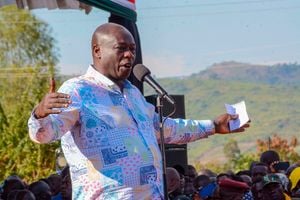Titus Mbathi: How Moi fired me just for doing my job

Titus Kitili Mbathi, who is among the few independence-era civil servants-later-turned politicians still alive.
“What broke the camel’s back was an incident at the wedding of General Mulinge’s son at Stony Athi. The wedding was attended by the President as the guest of honour and several ministers, including me.
“After congratulating the young couple, the President announced that the Civil Servants Union and the University 192 Staff Union were working against the interests of the country. Consequently, they would be de-registered with immediate effect. When I complained to Jeremiah Kiereini—the Head of the Civil Service, seated next to me—for not being consulted, he told me he also knew nothing about it.
“As Minister for Labour, I felt duty-bound to advise the President that in accordance with the ILO convention on employment, to which we were signatory, the unions should have been given an opportunity to defend themselves before being deregistered.
“When I met the President at State House the following week, I requested him to reconsider his decision as it was contrary to the ILO convention to which we were a signatory. The President’s reply literally shocked me. He told me that as a sovereign state we could do whatever we wanted. Then looking me straight in the eye, he asked me whether I was the same person whom he had appointed as minister. It was then clear to me that my goose was cooked and that my days as minister were numbered. Since then, his attitude towards me changed and he was openly hostile.”
Titus Kitili Mbathi is among the few independence-era civil servants-later-turned politicians still alive. Mbathi saw the colonial flag lowered and the Kenyan flag raised. He served the first post-independence government, worked under Moi as a Cabinet minister and Mwai Kibaki, with whom he schooled at Mangu High School. There is no doubt that Mbathi—Tito to his friends and relatives—has lived well, for a man who was born under colonial rule and has seen five presidents take the oath of office in Kenya. Reading his memoir, My Life’s Journey: An Autobiography (Bounceback Books, 2022), is like reading a manual of how to live successfully in a turbulent Kenya.
Mbathi is known today as a retired politician and an astute businessman. But few Kenyans know that he retired from government at just 43 to go into private employment and business before joining politics. But by the time of his retirement, Mbathi had amassed a lot of experience.
He had schooled in his native Kitui, got admitted to Mangu, passed his final exams with a distinction but failed to get admission to Makerere University, ostensibly because he did not have the right subject combination. Mbathi remained focused and trained as a P1 teacher, after which he taught at Machakos High School.
Mbathi would resign from government in his early 20s after he was awarded an Indian government scholarship to study Bachelor of Arts. In India, he was made to study for an intermediate certificate, an equivalent of A-level, before joining Madras University for a BA in Economics and Political Science. On return to Kenya, Mbathi was employed by the colonial Public Service Commission as a community development officer.
As Kenya sprinted towards Independence, Mbathi travelled to America for graduate studies on a Fulbright scholarship. He enrolled for a Master of Economics at the Graduate School of New York University in 1960. He returned to Kenya in 1961 and rejoined government service at Jeanes School, Kabete, as a lecturer in economics.
Civil service
From the school, Mbathi joined the East African Common Services Organisation, the precursor of the East African Community, as an assistant secretary in the Treasury, from which he would be appointed the director of personnel in the Prime Minister’s office in 1963. Mbathi was only 35 at the time. A year later, he became the Permanent Secretary in the Ministry of Economic Development, under Tom Mboya and Kibaki.
So, by the time Mbathi resigned from government service at 42, he had done his service and made his contribution to the new country’s progress for 14 years. He thereafter joined the world of international maritime services at Agence Maritime International (AMI) as a regional representative. He then ventured into private business in air freighting, real estate, commercial farming, ranching, and horticultural farming. In many senses, his hardwork and commitment allowed him to enjoy Matunda ya Uhuru.
However, when a Kenyan succeeds at work or in business and is seen to have made some money, they will definitely be visited by political entrepreneurs.
People from the person’s native village will start whispering to him or her, or their immediate and extended family, that so and so is ripe to be ‘our’ leader. It is only natural that Mbathi would hear such calls and take “a keen interest in politics” despite his own confession that he “… had no intention of active participation in what I perceived to be a risky venture.”
He could not avoid the temptation to join politics. Mbathi would change his mind about politics in 1974. He writes that part of what pushed him into politics was the “poor performance of our area Member of Parliament.”
He says: “There was no doubt that with my vast experience in the public and private sectors, I could effectively represent our constituency in the National Assembly. This was reinforced by Kanu party leaders who promised to support me. Opinion leaders in our constituency also predicted that I would win. Besides, I had accumulated adequate resources, sufficient to run a political campaign.”
But Kenyan politics is about huge investments prior to declaring one’s candidacy. Among the expectations from the voters in the rural constituencies is that the contestant should have a ‘worthy home’ or what Mbathi calls “an impressive country home”, which he had to build back in Kitui. Thereafter, visitors trooping to the home for meetings must be fed well. After signalling one’s ability, the candidate has to build a network of agents and supporters, all from one’s own resources.
Mbathi would get his opportunity when President Moi called a general election in December 1978. He writes: “I began my preparations for the campaigns by forming a strategic committee consisting of opinion leaders drawn from all locations in the constituency…. The strategic committee and I were responsible for coordinating subcommittee activities. I was also expected to interact with constituents at fundraising meetings, church services, weddings and funerals.”
Touring the constituency for the entire campaign period is mandatory, not just to sell one’s agenda but also undo what is often the competitors’ damaging innuendos.
If one throws their hat into the political ring, they should be prepared for the battle on all fronts. However, Mbathi hadn’t known that even his family would be dragged into politics and his own identity cast in doubt. First, the opposition started a rumour that Mbathi’s wife “Cathryn, an African-American, regarded African women as dirty and would not permit them to enter our house before spraying them with some disinfectant.” About him, the competition claimed that he was “… so detribalised that I could hardly address a meeting in our local language, Kikamba.”
Besides having to fight propaganda and accusations, one has to pay supporters, musicians and speakers on the campaign trail.
Politics in Kenya is a full drama script as Mbathi found out: opponents would spread rumours that “scheduled meetings had been cancelled”; youths would be hired to physically “disrupt meetings”, meaning one has to hire a “team of youths to deal with intruders”; bribery of voters is quite acceptable; election officials are on the take; visiting a medicineman for ‘victory charms?; vote stuffing or rigging is the climax of the political play. In the end one could lose an “election by a few hundred votes.”
It was a baptism of fire, one that came with several lessons. He lost the election to his opponent. However, Mbathi filed a petition at the High Court on the basis that his opponent had engaged in electoral malpractice. He got justice when the winner was found “guilty of an election offence and barred from contesting an election for five years. He would easily win the by-election to join Parliament as MP for Kitui Central.
For a man who had worked in government in senior positions, Mbathi only served as an MP for a few months before being appointed by Moi as Minister for Labour. This was familiar territory for Mbathi. He writes that he enjoyed his work, especially travelling to the rest of the world to represent Kenya at the International Labour Conference in Geneva. And it was his commitment to international labour practice that led to his downfall.
How?
Mbathi writes that when he was the Minister for Labour, “Kenya was highly respected for complying with international labour conventions and employing the best labour practices.”
But after the 1982 attempted coup, Moi’s “style of governance changed dramatically,” according to Mbathi. Apparently, Moi opted to trust “designated informal agents whom he trusted fully. In Ukambani his agent was Mulu Mutisya, at the Coast Sharif Nassir, in Nakuru Kariuki Chotara, and in Rift Valley Ezekiel Barngetuny. These agents wielded immense political power and were de facto representatives on whom he relied. Any politician who crossed their path risked losing the president’s favour.”
Political kingpin is a title that politicians love. Some politicians from Ukambani wished to appoint Mbathi their leader when Mulu Mutisya was by then the undisputed ‘king’ of Ukambani. Despite withdrawing his bid to become the leading light of Ukambani, Mbathi had already crossed a sacred line that he did not even know existed.
To make a bad situation worse, he innocently sought to advise Moi, as the Minister of Labour. Why? The president had instructed that the Civil Servants Union and the University Staff Union be “deregistered with immediate effect” for “working against the interests of the country.”
Still convinced that the president would listen to his Minister for Labour, Mbathi “requested him to reconsider his decision as it was contrary to the ILO convention to which we were a signatory.” The president wasn’t convinced and told him “that as a sovereign state, we could do whatever we wanted.” Moi “then looking me straight in the eye asked me whether I was the same person who he had appointed as minister.” Mbathi writes that it was “clear to me that my goose was cooked and that my days as minister were numbered.”
As he had imagined, Mbathi would go on to win the campaign battle against his opponent in 1983 but lose the snap election. He mulled petitioning the results but was advised that the existing regime did not favour him.
The 1988 election was no different. Against the advice of informers that the state did not favour him and the president introducing a candidate that the party favoured, Mbathi contested the election but lost at the secret ballot stage. He opted not to contest the results in court.
When the 1992 General Election came around, Kenya was a multiparty democracy, although the ruling party was still influential. Unfortunately, Mbathi would be time-barred from presenting his nomination papers because he did not have his national identity card. He opted to support Charity Ngilu, who went on to defeat the Kanu candidate. Mbathi writes that the 1992 election “marked the end of my active participation in politics”.
Stressful life
He had learnt tough lessons. In his words, “an MP leads a stressful life. In his campaigns, he spends a considerable amount of money on advertisements, posters, transport, harambee and other activities in his constituency. After getting elected, his constituents visit him at odd hours very often making requests for financial assistance to meet miscellaneous needs such as paying school fees, and to cover medical and funeral expenses. Prior to the introduction of the Constituency Development Fund, MPs had to rely on their own resources to meet these needs. The stress of parliamentary life often leads to family conflicts.”
Granted, MPs have endless requests for help from their constituents. But for a man who was once a community development officer and worked in the Ministry of Economic Development, Mbathi doesn’t really address the big, nagging question: how did Kenya end up in this situation? Why do Kenyans still depend on their MPs for basic needs 60 years after Independence? What happened to the dreams of the anti-colonial struggles? What happened to all those development plans of the 1960s and 1970s? Why is the gap between the haves and the have-nots expanding exponentially? What did his generation do right that Kenyans can copy today; and what did they do wrong that Kenyans should avoid?
Mbathi has some answers to these questions in the last chapter of My Life’s Journey. They are worthy words of wisdom from a nonagenarian who has seen the good, the bad and the ugly of Kenya. But his wise words appear too few – one would have wished for a broader take on Kenya’s past, present and future. One wonders whether Mbathi’s generation could not have steered this country in a totally different direction, given that they founded the country.
The writer teaches literature at the University of Nairobi; [email protected]





